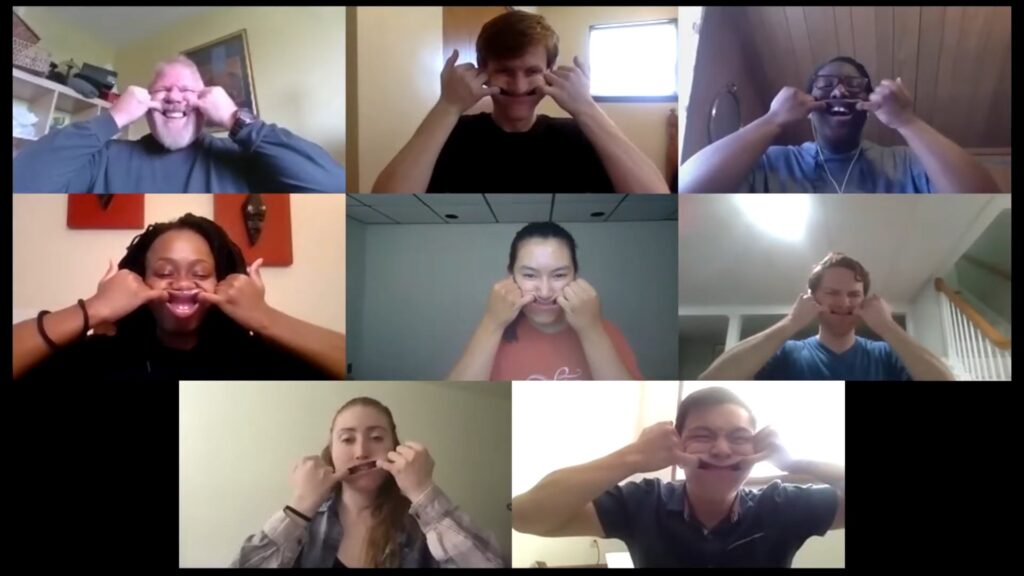Shakespeare Organizations during COVID-19: Shakespeare at Notre Dame

First, for anyone who might be unfamiliar, tell us a little bit about Shakespeare at Notre Dame, your organization, and your role.

Shakespeare at Notre Dame is an independently managed theatre company based at the University of Notre Dame. We are the home of the annual Notre Dame Shakespeare Festival (NDSF), as well as the American base for Actors From The London Stage (AFTLS), the renowned British touring company. In my role as Audience Development Manager, I handle all marketing operations including our website and social media channels, as well as all print, broadcast, and digital media. I’ve never had so much fun wearing so many hats… even now, in a pandemic.
COVID-19 has impacted everyone, but could you tell us a bit about the specific difficulties Shakespeare at Notre Dame has faced during this time? Is there a way that our members could help support the work that you are doing?
COVID-19 wiped nearly everything off our calendar. Our spring AFTLS tour was cut short, requiring all 5 members of the cast to fly directly back home to England a week early. (Thankfully, they all got home smoothly.) We had to reschedule our annual NDSF productions to next summer, and later had to cancel the fall 2020 AFTLS tour of As You Like It. Grant Mudge’s Shakespeare classes at DePaul Academy here in South Bend went online; Grant was only allowed back into the facility after meeting a series of strict safety protocols. We also had to move our planned 4th international Shakespeare in Prisons Conference online. Notre Dame, of course, is officially shut down at the moment, so we’ve all been working from home since early March. Plus, many of us are parents, so we’re homeschooling our kids on top of everything else.
We were fortunate to be able to shift to an entirely digital program for both our summer NDSF season and the Shakespeare in Prisons Conference this year, all of which can be found at shakespeare.nd.edu. This summer’s NDSF events range from workshops and presentations to prerecorded (and sometimes live) Q&As and performances. The best way audiences can support us is to watch these events as they become available, share them, and support the presenters, performers, and participants however they can.

What are some of the resources you have online that you would like everyone to know about?
Our digital content is available on our newly redesigned website, shakespeare.nd.edu, and although we are only 3 weeks into our NDSF 2020 online season (as of this writing), we’ve already covered a pretty broad range. We just had a wonderful voice and text workshop with Stanton Davis, for example, which featured student actors working through vocal performances and exercises, and we’re also developing future events for a more scholarly audience. We’ve already featured student performances and introductory workshops, with more to come. Each event so far has been different, and yet each one can be enjoyed by anyone.
Scott Jackson has also hosted a series of panel discussions with our Shakespeare in Prisons Network colleagues, all of which are of immediate importance to the ongoing discussion of race relations in America. In such a galvanizing time, each of these panels and discussions have been extraordinarily revealing, uncomfortable, and essential. It’s impossible to walk away from them unchanged and unchallenged. You can find these discussions at shakespeare.nd.edu, or on our YouTube page.

This crisis has required a great shift for many organizations. Are there any lessons or changes you will implement after we have weathered COVID-19?
Well, going entirely digital has required us all to put on even more hats. Going from creating live, in-person performances to producing and managing 16 digital broadcasts, for example, makes for quite the learning curve. Fortunately, we’d already built an infrastructure which simplifies the technical aspects of hosting and streaming events, and we’d already shifted to producing digital programs, as opposed to printed ones. In a way, it’s been beneficial to discover just how many things you can achieve in a digital space, with little or no training, and while I’m sure we all would prefer a return to packed theatres, it’s been an exciting challenge to find new ways to engage our audience. (Exciting… and terrifying, and humbling.) The key has been to create events that our audience both wants to see and benefits from seeing, particularly in a time of such division and unrest. COVID-19 has certainly given us all a crash course in adaptation and improvisation.
Is there a certain poem or play that has brought you comfort during this time? If so, could you share?
My personal favorite Shakespeare drama is Richard III, and I can think of no other work which gives us such an incisive look at a figure whose appetite for power recognizes no moral boundary. So as much as it makes me uncomfortable, given the present climate, I think its lessons are instructive.
Thank you so much for taking the time to share this! Any last words?
We’re all in this together. I know I’m preaching to the choir here, but supporting arts organizations at the local level is absolutely essential. No matter where in the country that you are, there’s always going to be someone who wants to do the work, and we should all be supporting those endeavors however we possibly can.

